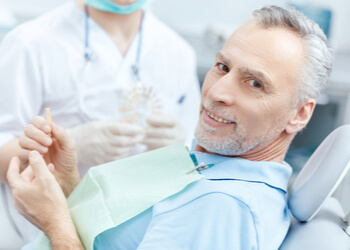A very common question patients have when undergoing any form of dental implant surgery is ‘What am I able to eat?’ Nourishment is a crucial part of everyone post-operative care. It helps your body to stay strong and promotes quicker healing. Once a dental implant procedure is complete, it’s necessary to adjust what you would eat normally and instead switch to a dental implant recovery diet. Don’t worry if you aren’t sure what that entails, because typically we give you a ‘recovery nourishment options’ list after your treatment to make the transition smoother. That said, there are a few best practices to aid the healing process that everyone should be aware of. Let’s take a closer look…
Dental implant recovery diet – The first 14 days
In the first few days after receiving dental implants both your teeth and jaw are likely to feel tender. So for the first 24 hours at least it’s crucial to stick to a soft food diet. The idea is to eat foods that are packed in nutrients and avoid junk foods and sugary drinks where possible, including energy drinks. So items like…
- Natural yogurt
- Cottage cheese
- Avocados – think guacamole!
- Hummus
- Softly scrambled eggs and
- Smoothies (not with a straw)
… are all good.
Points to remember
Avoid foods that are too hot (tepid is good at this stage). Also avoid foods that might irritate or get lodged in the dental implant site such as seeds, oats, cracked pepper, or popcorn. Finally, avoid citrus or spicy foods and drinking through a straw. Soft, plain, nutritionally-rich foods are the way to go at this early stage of recovery. To help you plan meals and to aid the healing process, we recommend that you incorporate the following foods:
- Cold or chilled soups such as gazpacho or avocado
- Smoothies – These are both nutritional and filling so be inventive.
- Softly stewed or mashed fruits – While you won’t be able to bite into a piece of fruit, softly stewed fruit like apples or mashed banana are a good source of nutrition.
Finally, always drink plenty of water. Good hydration promotes a faster healing process. So now you know what you can eat after receiving dental implants, what about what you shouldn’t eat? Foods that are a definite ‘no’ immediately after dental implant surgery include:
- Acidic, citrus or spicy foods
- Oats and seeds
- Chewy or crunchy foods
- Very hot foods or liquids such as hot soups, tea or coffee.
Dental Implant recovery diet – 14 – 21 days
After 14 days or so, the dental implant site will start to heal. As it does so you can slowly start to introduce more solid foods into your diet as you see fit.
Again choose foods or beverages that are rich in protein and nutrients to aid a speedy recovery and as always, stay well hydrated.

- Eggs/omelettes – Eggs are easy to chew, easy to digest and are incredibly versatile. Make an omelette with cooked vegetables for a well-balanced meal
- Potatoes – One of the hardest parts about sticking to a soft food dental implant recovery diet is the lack of variety. Thankfully, potatoes are a versatile food that can be cooked in many ways without losing their soft texture.
- Fish – A great source of protein and one that is low in fat is fish. Consider steaming a piece of salmon or baking a piece of cod until flaky for a healthy nutritious treat.
- Ground beef – While it should be avoided in the first week or so after undergoing dental implants surgery, ground beef is a good source of protein and Vit B1. Vitamin B1 helps the body to repair and grow tissue and should, therefore, be introduced back into your diet where possible.
- Pasta – Avoid pasta with acidic sauces such as tomato, for a short while at least. However, meals like Mac and cheese are filling and contain calcium that further aids the healing process.
- Soft fruits – Mangoes and bananas lend themselves well to a dental implant recovery diet at this stage because they are nutritious and require no crunching. Add some natural yoghurt and drizzle with honey to make a satisfying pudding for those with a sweet tooth.
Dental implant recovery diet – 21 days and beyond
By this stage, your dental implants recovery process should be well underway. Any bruising and swelling should be long gone and the jaw area should feel less tender to the touch. At this stage, you can and should start to introduce more regular foods into your diet. Foods like:
- Chicken – Chicken in most forms can be eaten at this stage. Dishes such as chicken soup, chicken and mashed potatoes, or a chicken Caesar salad (without the croutons) are ideal.
- Vegetables – Consider a serving of leafy green vegetables like steamed broccoli and kale as a good option after dental implants surgery. Both are a good source of iron and calcium – the latter of which is needed for bone strengthening and growth.
- Other lean meats – Meats such as skinless turkey, pork fillets, or tenderloin steaks can also be introduced. They should be sufficiently tender to digest without much chewing.
The healing process
When combined with rest and recuperation, consuming the right foods at the right time can help to bring about a speedier healing process. Most importantly, be sure to include nutrients such as protein and calcium. When included in your diet, these alone should speed up the dental implants recovery process.
If you would like to find out more about any element of dental implants surgery or dental implant recovery diet and what you might expect, don’t hesitate to talk to the team at the Digital Dental Implants Institute. Book a consultation and see how our Sydney dental implants team can help you today.






